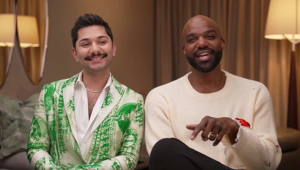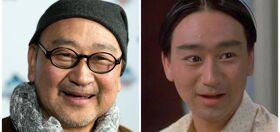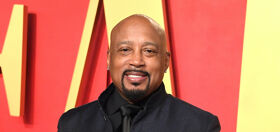
You’re probably never heard of Ric Weiland, but if you’re queer, you’re better off because of him.
Weiland came out as gay as a teenager, when he told his close friend Bill Gates (yes, that Bill Gates) he was attracted to other men. Years later, Weiland & Gates would help found Microsoft, the company which helped usher in the digital age. Following an HIV diagnosis, Weiland also became a quiet advocate of LGBTQ rights, donating more than $100 million to various queer charities including GLAAD, amFAR, Lambda Legal and PFLAG. He also advocated for LGBTQ discrimination protections in major companies such as Microsoft and General Electric. Despite all his achievements, Weiland always avoided attention. He took his own life in 2006.
So how does a man of such fortune and glory go unnoticed? Director Aaron Bear now confronts those questions and sheds some light on Weiland’s life in Yes I Am: The Ric Weiland Story, playing the Provincetown Film Fesitval online beginning June 16. Featuring interviews with friends, boyfriends and business associates including Bill Gates, Bear attempts to reconstruct the life of a discreet queer hero, and explore the issues of his contradictions & untimely demise. For Seattle-native Bear, Yes I Am represents a follow-up to his previous documentary Finding Kim, a film about a middle-aged transgender man.
We snagged time to chat with Bear about Yes I Am, Ric Weiland, and the confounding questions surrounding his life. Yes I Am: The Ric Weiland Story plays the Provincetown Film Fesitval online beginning June 16.
How about we take this to the next level?
Our newsletter is like a refreshing cocktail (or mocktail) of LGBTQ+ entertainment and pop culture, served up with a side of eye-candy.
So how did you first learn of Ric Weiland?
It’s funny, I was approached by one of his good friends, Michael Failla, after a showing of Finding Kim, my first feature at the Seattle International Film Fest. You know, at a film fest, you have all of these five-minute conversations. It was one of those. I was like sure, yeah, email me. Well, he did in August 2016. I went over to Michael’s house and got a glimmer into who Ric was. Initially, I was like who wants to hear about a rich white guy from Microsoft? But the more I got into the dirt of Ric’s life, I started to realize he changed the landscape for all queer people and nobody knows who he is. I became invested; I never thought I would do another documentary.

Yeah?
Naively I thought this one would take a year’s time. So I hear I am four years later. It’s interesting. I never met Ric. He never gave interviews; he was elusive on purpose and didn’t want to be in the limelight. So that was a huge challenge. The video you see of him in the film is the only video that exists of him. I searched high and low for it.
Wow.
It was also a great challenge as a filmmaker. I’m telling a story about someone who is no longer with us, and a story through friends, all of whom have their own idea of who Ric was. I’m also putting my own stamp of who I think Ric was. At the end of the day, I think Ric was this queer pioneer on a genius level. Emotionally and his personal life—those were things he struggled with. But in business, he obviously succeeded in spades. But that doesn’t equal happiness. I was never trying to solve the “why” of why he took his own life. It would be so trite as a filmmaker, and I’d be doing a disservice if I tried to figure out the why.
I understand.
For me, it was just trying to showcase who he was and what made him tick and the significant change that all of us queer people now benefit from. He was at the forefront of HIV/AIDS research, gay marriage, philanthropic efforts—the whole thing. The fact that he didn’t want the spotlight says a lot about him as a person. Honestly, David, it’s been cracking a cold case open.

You already mentioned the lack of archive footage you could use. How big an obstacle is that for you as a documentarian?
Initially, I went to the usual suspects: old news footage, archives, more regional news footage, and Microsoft. Bless them, Microsoft ended up being a dead end. Luckily, after he died his stuff was donated to Stanford. So I contacted the archives at Stanford. They had it cataloged, but since I was a student I was only allotted four hours. I had an hour to set up my camera, an hour to dig through boxes, an hour to shoot, and an hour to get out of there.
Oh lord.
Through that, I found his journals dating back to 1975. As I was doing this, I realized that is his voice straight from his brain. So I digitized all his journals, which is quite pricey, by the way.
Related: Microsoft Hires Comedian To Introduce Xbox One, Humiliates Trans Gamer Instead
No doubt.
Then it was a task of reading them—pen written journals from 1975 till his death. It felt a little conflicted. Those are private journals. So I wanted to keep the important stuff, but nothing salacious. I chose the path of honoring his life and legacy. Whomever I’m doing a film about, I want to honor that person, how he would want to be seen.
That’s admirable. Tell me a bit more about his journals. One recurrent theme in his life is this weird feeling of inadequacy. He constantly felt like he had nothing to offer people. And this was a man who was very popular, very good-looking, had an interesting job, he was very wealthy.
Yeah. On paper he had everything. It goes to show no matter how much you have, sometimes it never feels like enough.

Why do you think he felt like he wasn’t enough then?
I don’t know. I think one insightful clue into what made him tick: Ric would write in his journals, and he would color code the journals.
What?
Yeah. Everything blue had to do with Microsoft. Everything green was money. Red was sex and dates and love. Yellow was family. So, in a way, he did a lot of work for me. But again, I don’t even know what you would call that kind of person. I sometimes re-read my journals, but he color-coded them. So it was easy to reference things, but the fascinating, human thing was no matter how much money he had, it didn’t matter. I think Ric’s brain just worked differently in a way. I wish I had a more concrete answer.
That says so much about him—though I’m not sure what. I have never heard of anybody color-coding his own journal. I mean, why? For his own reference? I guess that does speak to his genius brain.
I do feel like he was on some genius level of thinking. Again, he was so adept in his work, but in his waking emotional life, struggled to connect with people. Throughout all of this, I also started seeing a therapist and diving into my own mental health for the first time. I don’t think that was a coincidence. I think it played a part in how I made the film.
One anecdote Bill Gates tells here is how Ric just kind of came out to everybody when he was 15, and everyone shrugged it off.
Yeah, for Ric it was this matter-of-fact thing. I think, as queer people, we all anticipate some kind of reaction. I think Ric did that, but when Bill and Paul were like oh, ok. It enabled him to be that much more successful at work. Ric’s impact at Microsoft is significant. He wrote Word and did all these things at Microsoft while quietly leading the way for organizations like ACT UP and the Seattle Cancer Care Alliance. All these things that exist now would not exist without him.
I get the sense he was a proud gay man.
That’s another head-scratcher. All these things Ric suffered through—being gay was not one of them. He was so sure of himself being gay. It was just a scientific fact.
Well, and so it is. Maybe that’s where that confidence comes from.

You include extensive interviews with Ben, his former partner, and Mike, his final partner. What interested me was that they don’t discuss much of what he was like as a boyfriend or their day-to-day lives. I know you say you wanted to eschew anything salacious, but was that something they were reluctant to discuss?
I did. Ben mentions it very briefly: Ric had a problem accepting love in general. Ben would say “I love you,” and Ric would have a hard time knowing how to navigate love. It would be amazing if someone got all the gifts. I think Ric got a tremendous amount of gifts in his own world, but in romantic relationships, he did the best he knew how to do. There was tremendous love there. I had a longer cut dealing with more of this personal stuff, but it dragged the film down a bit. Maybe someday I’ll do a longer cut.
It would be great to see. The other lingering question I had was that everyone, in the last days of Ric’s life, could see something was wrong. He was coming apart. Having talked to everyone and read his diaries, did you get the sense that he was just reluctant to get help? Or was it his HIV—someone speculates that could have caused changes in his brain?
Speculating, I think it was a culmination of things. All of his philanthropic efforts were a well-oiled machine at that point. So he was feeling like now what? His HIV was getting worse, and this combination of pills he was on has since been taken off the market. I think he was just having a moment of questioning everything in his life. And…
[Long pause]
All of his friends, his partners were there to help him. But at the end of the day, if you want to do something, no matter what anyone else says, you do it. Ric, if he had something in his mind, he was going to do it.

This is a really morose thought, but is it possible he felt like he could do more good in death? In other words, he knew he could give all his money to charities?
That’s actually a great question. Dark as that is, I do think that crossed his mind. Before he took his own life, he went and bought a book called Final Exit about how to properly take your own life. He wanted to do it correctly.
Amazing. You focus on this dichotomy when it comes to Ric’s personality.
Yes.
He’s analytical, but artistic. He’s successful in a straight world during a very homophobic period, but an openly gay man. It’s amazing to me that a man who was so assertive and unapologetic would feel so worthless. Is that part of his greatness? Are great men all men of great contradictions?
I have thought a lot about this, David. I even look at myself sometimes. We’re all different people at different points in our lives. In film, you’re only as good as your last movie. I think Ric had a bit of that: he’d done all this philanthropy. He’d started Microsoft. He’d helped the queer community. He had a close circle of friends. I think he wanted more for himself, but didn’t know how to ask for it. I’ve thought a lot about the contradiction of an easy-going guy with friends, parties, dresses up and by day works at Microsoft, but is very private. I can relate to all those things in a way, but I wish he was here to answer that question. It’s inspiring and heartbreaking at the same time.
What’s next for you?
I’m working on a TV show called There’s a Light that Never Goes Out, based on true events. I’m also making a film about a friend of mine. Her dad was one of the first people to die of AIDS in 1983. I’m writing the script around it. I guess I can’t get away from true events.
Yes I Am: The Ric Weiland Story plays the Provincetown Film Fesitval online beginning June 16.


















